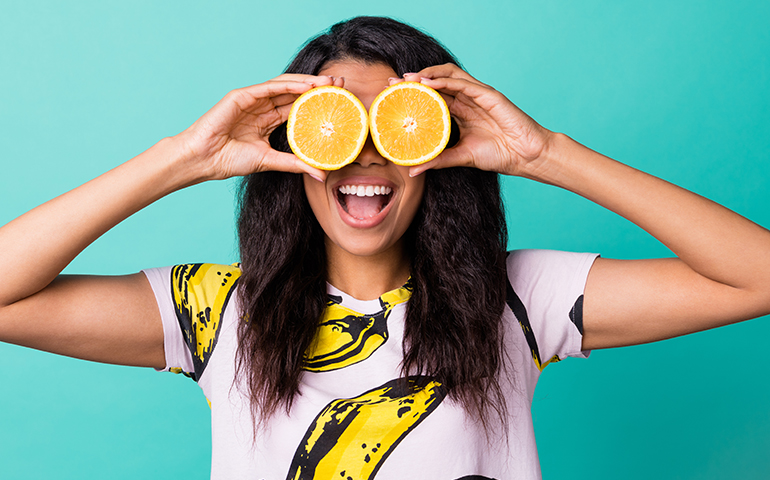Foods to improve eyesight

Foods high in specific vitamins, nutrients, and antioxidant substances may improve eye health and even reduce the onset of some eye conditions. Free radicals (small substances harmful to the body) may form in the retinas of eye cells. Antioxidative compounds found within certain products inhibit the free radicals causing eye irritation, and promotes eye health. Vitamins and minerals are a good way to promote the natural functions of the eye and prevent certain diseases.
A balanced diet benefits our whole body, and our eyes are no exception. With autumn on its way, we’re serving up five vision-friendly (and delicious) foods to help keep your eyes in tip-top condition. Bon Appétit!
Carrots

We’ve all heard the old age myth about eating carrots for better eyesight. But is there any truth to this vegetable factoid? While carrots won’t give you supervision, they are loaded with beta-carotene, a powerful antioxidant that helps you maintain good vision. Your body converts beta-carotene into Vitamin A, which is used in forming the pigments that see light and helps with night vision.
Leafy greens

Leafy greens such as kale and spinach have become increasingly trendy health foods – and the hype is entirely justified. They are packed with Vitamin C & E and also contain powerful carotenoids lutein and zeaxanthin. These two antioxidants help filter harmful blue light from the underlying retinal structures. This also reduces age-based macular degeneration and reduces the risk of cataract development. The Macular Society recommends adults eat 10 mg daily, which is equivalent to 90 grams of kale, 130 grams of spinach and 300 grams of broccoli.
Lutein and zeaxanthin are fat-soluble, so drizzle on olive oil for max absorption (and deliciousness!). Don’t like leafy greens? Eggs, corn, berries, avocados and kiwis are also rich sources of Lutein and Zeaxanthin.
Salmon and oily fish

Our eyes need Omega-3 fatty acids to function properly. Filling up on cold-water fish such as salmon and mackerel can help ease the symptoms of dry eye syndrome and stave off conditions such as cataracts and age-related macular degeneration (AMD). If you’re looking for a delicious autumn snack, why not whip up a smoked mackerel pate served with warm toast?
Yellowfin tuna is one of the most valuable of selenium. Selenium is an important antioxidant and carries the potential for good eye health by protecting the lens of the eye, decreasing your chances of developing cataracts.
Nuts

If you’re not a fan of fish, you’re in luck: Walnuts pack an impressive amount of plant-based omega-3s. The vitamin E in almonds, peanuts and other nuts also protects the cells in our eyes from free radicals, which can break down the healthy tissue.
Since nuts require almost no preparation, they make an easy mid-morning snack. They’re also pretty tasty roasted or sprinkled on cereals, yoghurt and salads. Go nuts!
Citrus fruits

Vitamin C is a health powerhouse. The entire body depends on it to grow and repair tissues and cells, and our eyes are no exception. Zesty fruits like oranges, clementines and lemons are loaded with vitamin C and antioxidants that help to maintain healthy cells and tissues in the eye. It also helps to build collagen, which provides a structure for your cornea.
Looking for an easy way to get your daily dose? Jazz up your salad, add a little zest to your casserole or grate lemon zest over a rosemary roast chicken. Autumn staples like sprouts, broccoli and cauliflower are also rich in Vitamin C.
Want more on eye health? Head over to our Lenstore Hub, packed with expert advice on everything from exercising in lenses to caring for your contacts. Alternatively, if you know which contact lenses you want, order them here from Lenstore.